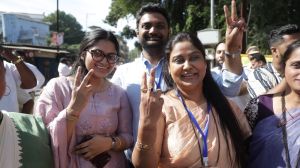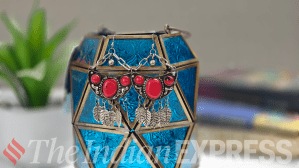Maulana Arshad Madani, president of Jamiat Ulama-i-Hind (Arshad Madani faction), was recently in the eye of a storm for saying that “Om and Allah are one”.
“When there was no one (no Gods), the question is who did Manu worship?… Very few people know that when there was nothing in the world, Manu would worship Om. I asked, ‘Who is Om’. Some said Om has no colour, no shape. Like the air, it is everywhere. It made the skies and the earth. I said this is what we call Allah. You call the same thing Ishwar,” Madani said.

Madani was speaking Sunday at the three-day general assembly of the Jamiat Ulama-i-Hind (JUH) at Ramlila Ground, with Hindu, Jain, Christian and Sikh leaders in attendance.
The Jamiat Ulama-i-Hind is a 104-year-old organisation of Indian Muslim scholars. In the lead-up to India’s Independence, the JUH had staunchly opposed the Muslim League’s politics and the partition of India. Today, according to its website, the JUH has 10 million members and 1,700 branch offices across India. Through a network of sub-organisations, it works in the fields of education, charity, safeguarding the rights of Indian Muslims, and aims to foster amity between different religious communities.
“In its century-old history, the Jamiat Ulama-i-Hind has stood for unity and amity between different communities of India, and the integrity of the nation, while working to protect the rights of Indian Muslims through Constitutional means,” said Akhtarul Wasey, professor emeritus of Islamic Studies, Jamia Millia Islamia.
History of the Jamiat Ulama-i-Hind
While the JUH was formally founded in 1919, it was on outcome of a movement going back to the 18th century, when social reformer Shah Waliullah Dehlawi (February 21, 1703 – August 20, 1762), disappointed with “the degeneration of the ruling classes, coupled with the depredations of European imperialism”, according to the JUH website, decided to “remodel all aspects of Muslim life including its religious, social, political and cultural dimensions-through the espousal of ijtihad (independent reasoning) and the rejection of taqlid (unquestioning acceptance).”
Till the First World War, Muslims inspired by Waliullah participated in armed resistance to the British, of which two notable events were the Revolt of 1857 and the Silk Letter Movement of 1916.
Story continues below this ad
The Silk Letter Movement involved Indian Muslim scholars working to enlist the help of other Muslim nations, such as Turkey and Afghanistan, against the British. Communications during this movement were made through letters written on silk scarves, which gave it its name. The conspiracy was discovered by the British, who imprisoned top clerics, including Shaykh al-Hind Maulana Mahmud Hasan and Maulana Husain Ahmad Madani, in deplorable conditions in Malta. Arshad Madani is the son of Maulana Husain Ahmad Madani.
The failure of the Silk Letter Movement made the Muslim clerics look for other, more effective ways to fight the British, and they turned to non-violent, political methods, joining forces with the Congress party.
JUH’s foundation, role in freedom struggle
On November 23, 1919, the Khilafat Committee held a conference in Delhi, attended by Muslim scholars from across the country. From among these scholars, a group of 25, including the likes of Ahmad Saeed Dehlavi, Kifayatullah Dihlawi, Muhammad Ibrahim Mir Sialkoti and Sanaullah Amritsari, came together to form the Jamiat Ulama-e-Hind. Its first session was held on December 28, 1919. The Jamiat’s efforts received a boost with the release of Shaykh al-Hind and others from prison.
Story continues below this ad
As the Independence movement gathered steam, so did the demand for a separate homeland for Muslims. “However, the JUH always resisted this demand, steadfastly asserting that India should not be divided. Their stand has been documented in history, and is proof that not for a moment did all, or most, Muslims in India want partition,” said Zafarul Islam Khan, author and former Chairman of the Delhi Minority Commission.
Wasey reiterated Khan’s statement. “When Muhammad Ali Jinnah was arguing about nationhood on the basis of religion, Maulana Madani said ‘nation are made by homelands’. He said it was not necessary for people sharing a country to have the same religion,” Wasey said.
After Independence and Partition, the JUH worked to rehabilitate Muslim refugees.
Role in post-independence India
“After Independence, the JUH, in a session chaired by Maulana Azad, decided they would never form a political party based on religion,” said Wasey. “Individual members of the JUH have served as MPs and MLAs, emphasising their association and commitment to India’s democracy,” he added.
Story continues below this ad
The JUH has worked for riot relief, to educate Muslim youth, including girls, and provides legal aid to Muslim youth embroiled in legal cases. “In riots, the JUH has played the role of a fire brigade. They also work to make sure that youth educated in madarsas get degrees from the National Institute of Open Schooling (NIOS) too,” said Wasey.
Khan said the legal wing of JUH has helped many Muslims “who are jailed falsely”. “The JUH checks if the person in prison is innocent. If they feel the person has been picked up falsely, they extend aid. If they think the person could genuinely be involved in terror activities or other misdeeds, they don’t provide legal representation.”
Khan was present at the event where Madani made the comments that caused controversy. “I think the controversy was entirely misguided. All Madani was trying to do was emphasise our essential oneness and unity,” Khan claimed.
In 2008, the JUH had split, with the formation of the Jamiat Ulama-i-Hind (Arshad Madani faction). In 2022, the factions began their merger process, which is yet to officially conclude. The other faction is headed by Maulana Mahmood Asad Madani.








































